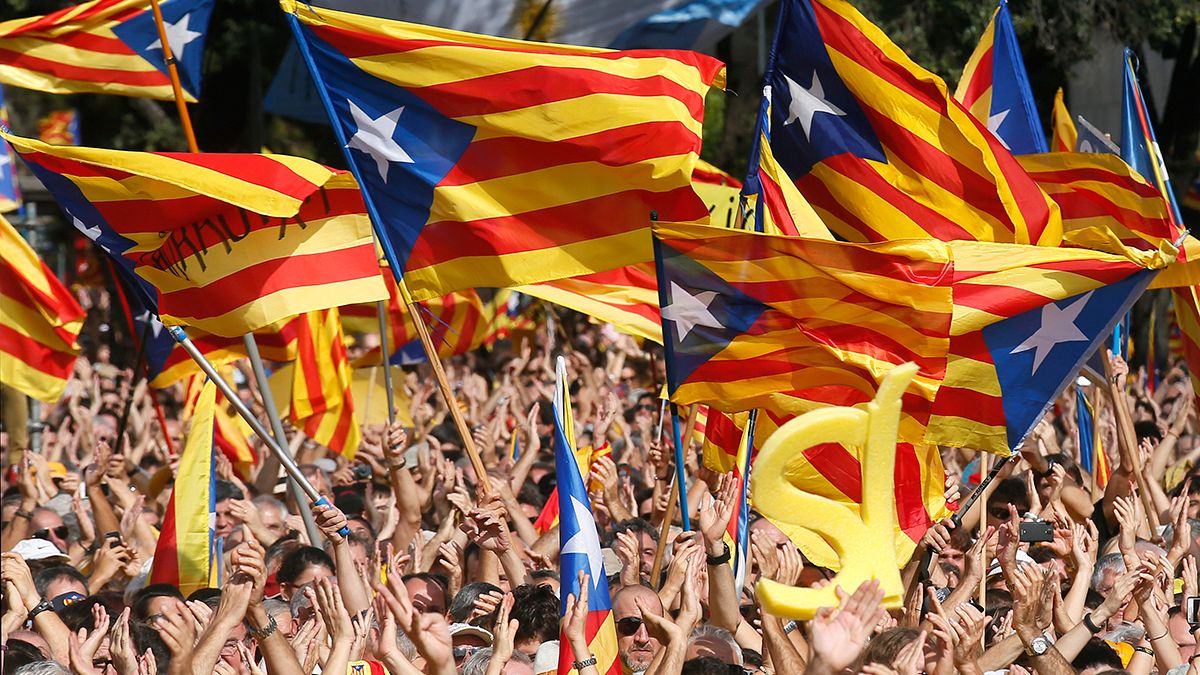He signed for it, prepared it, fought for it… it’s just not going to happen. Or is it?
Catalonia’s top politician Artur Mas decreed in September that the autonomous region in Spain would finally have a referendum on independence. It was an electoral promise. With it, the CiU nationalist right leader garnered the Republican Left’s support to govern with a minority after 2012.
Madrid’s firm response was, ‘oh no you don’t’; the Constitutional Court ruled a referendum would be illegal.
Conservative Prime Minister Mariano Rajoy’s words were pretty much, ‘I told you so’:
“We always said the vote was not going to happen because it is totally against the constitution. Today, we fulfil our obligation to lodge an appeal against a decision which seriously jeopardises the rights of all Spaniards.”
But it didn’t dampen the spirits of the pro-referendum, pro-independence crowd in Catalonia, where they demonstrated their unconcern over the ruling.
Protester Meritxell Borras, for instance, said: “I am very happy because I know that we will vote. Maybe not this time around because the central government may get away with it. It might be hard to do but we will. We will achieve our goal because we are the majority.”
After all the organising and preparation, it had become impossible to involve public sector workers like the police in any illegal act.
Was Artur Mas going to throw in the towel? That wouldn’t play well with the Republican Left allies if he wants to hold on to power.
So, the head of the Catalan government promises an alternative consultation, to be staffed by 20,000 volunteers on the chosen day, November 9. This is non-official, looser, non-binding, and it’s not against the law.
Mas said: “We still have a very useful tool, clearly identified. That’s what most scares Madrid: ordinary elections called by the President of the Generalitat, in which some parties might decide to make a united list with a single programme. If that list and programme are backed by an absolute majority of votes, the referendum is won.”
To understand the latest developments, euronews turned to the journalist and political analyst Josep Carles Rius, the online newspaper El Diario’s director in Catalonia.
Vicenç Batalla, euronews:
“President Mas has abandoned his initial plan for a referendum but is proposing another vote run by volunteers. Is it still possible to have a vote in November under such complicated circumstances?”
Josep Carles Rius, El Diario:
“Well it will be possible to vote but it will not be seen as a referendum or a vote with full democratic guarantees. We’ll be talking about a symbolic act over the recognition of the right to vote. There is a majority of people in Catalonia which wants the right to decide, but in this case, without the permission of the Spanish State, it turns out to be impossible.”
euronews:
“The Prime Minister, Mariano Rajoy, welcomed the withdrawal of the referendum but his government has now announced that it will also appeal against the alternative vote even though the legal framework is still unknown. Will this clash last until November 8, won’t there be any talks?”
Josep Carles Rius:
“I think the reaction of the Spanish Prime Minister, Mariano Rajoy, is more a sign of political short-sightedness. Regardless of what happens on November 9, Catalonia has a political problem. Right now it’s estimated that at least half of the population support a different relationship with the State and even a majority wish to be independent. There are also 70 percent that want this to be decided by the ballot box, who want to be able to vote. To unite its own rank and file, I suppose the Popular Party government has transformed the recognition of Catalonia into a problem, and until it’s resolved there’ll be no good news.”
euronews:
“Mas is now threatening early elections putting forward a joint list which could result in a unilateral declaration of independence if he gains an absolute majority. Will he succeed in forming such an alliance?”
Josep Carles Rius:
“I think the most important change that happened today is that we’re finished with this “right to decide” euphemism. Now it’s no longer about the right to decide but about independence. And the way to obtain that, now that a referendum is impossible, is by using elections as a plebiscite. But in this case there is no consensus as wide as there is over the right to decide. That’s why the Iniciativa per Catalunya (Greens and Socialists) have distanced themselves from the process and now we are waiting to see what Ezquerra Republicana (the Republican Left) does.”
euronews:
“Do you think that Mariano Rajoy can continue only using a legal approach in this Catalan affair?”
Josep Carles Rius, El Diario:
“I think Mariano Rajoy needs to unite his supporters who’ve been very affected by fiascos like the abortion law, corruption scandals and now the Ebola crisis. Rajoy needs to unite his voters and the Catalan issue is perfect for that. But this only postpones the problem.
“I think we are not going to see the end to this tug of war until the end of the local elections next May. Those elections are crucial in Spain because we’ll see new power sharing, and above all we’ll know more after the general election in early 2016.
“Finally I think we’ll see more clearly whether there is a process of political regeneration in Spain that could help find a solution to the Catalonia problem. Nothing is going to change with a Government formed from an absolute majority of the Popular Party in parliament.
“We have a confrontation here, a conflict between Spanish nationalism and Catalan nationalism. And in this situation there is no solution.”


